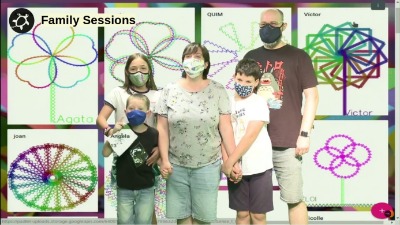The main goal is to improve the use of TurtleStitch, a freely available educational web application, on the basis of the practices and experiences of its active international community. The tool is about generative design constructed with a graphical programming environment and is mainly used for an output on embroidery machines. If perfectly combindes coding and computational thinking with the “A” in STEAM – the arts. The participating partners in the TEMP-group work in different educational contexts but have all met through TurtleStitch. The TEMP project will be used to gather and analyse the partners practices with the goal to trigger exchange and learning between formal and informal settings. This will inform the production of open training and teaching materials as well as software and community platform updates.
We do not start from zero. Each of us has already made significant individual experiences in teaching and learning with TurtleStitch. It has a highly creative approach and attracts people from different backgrounds, cultures as well as geographic locations. Citilab from Barcelona, a leading living lab in Cornella, Catalonia, focuses on an inclusive approach to technical development, which prioritizes bottom-up development and the self-articulated needs of local communities and citizens. Lyceum Montessori from Amsterdam as a formal education partner can address the possibilities and maybe limitations in a school framework, whereas Oseda from Vienna can support in specific software setups, always with the focus on open educational concepts.
Partners, users and developers, we all strongly rely and significantly profit from Open Source licensed educational software. TurtleStitch received an award for the best Open Educational Resource in the German-speaking countries in 2017 and will continue to release its produced resources under open licenses.
Beside licencing we think it’s crucial for open schooling to be inviting for diverse audiences. That’s what we try to approach by focusing on creativity combined with the possibility of connecting with local or individual cultural traditions as well as practising intercultural exchange. Openess also enables and encourages peer learning within and across the immediate setting (formal or informal) of the learner.
“What a great chance to reflect on diverse and shared experiences, interact with peers and getting inspired for the new..”
- OSEDA, Andrea Mayr-Stalder, amasta@oseda.org
OSEDA - oseda.org
Citilab - www.citilab.eu
Montessori Lyceum Amsterdam - www.montessorilyceumamsterdam.nl
Stichting Scratchweb - www.scratchweb.nl
Citilab - www.citilab.eu
Montessori Lyceum Amsterdam - www.montessorilyceumamsterdam.nl
Stichting Scratchweb - www.scratchweb.nl
Andrea Mayr-Stalder, amasta@oseda.org
Michael Aschauer, m@ash.to
García Yeste, jogaye@e-citilab.eu
Joek van Montfort, j.montfort@msa.nl
Wilfried Meffert, info@scratchweb.nl
Michael Aschauer, m@ash.to
García Yeste, jogaye@e-citilab.eu
Joek van Montfort, j.montfort@msa.nl
Wilfried Meffert, info@scratchweb.nl

